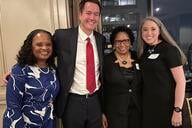You have /5 articles left.
Sign up for a free account or log in.
In the early days of search -- the admissions process of acquiring student lists from standardized tests or survey providers -- the process was treated as a routine event. Institutions would secure their list of high school juniors and seniors in October, drop it at the top of their communication flow, and kick off the annual recruitment cycle.
Digital sources changed all of that. In the early 2000s, it was websites like Zinch or Cappex. Today the main player is Niche. College help sites democratized the college discovery process by allowing students to find and compare institutions side by side and gain a level of control over who has access to their name. Compounded by cancellations of tests and limited access to surveys due to COVID-19, the shift to digital-sourced leads keeps accelerating. In 2020 alone, Niche added 500 partners and served over 50 million visitors.
Search is no longer an event … It is a continual process.
Engagement Has Rapidly Transformed
The admissions cycle used to work like clockwork. Admissions counselors hit the road in the fall to visit high school counseling offices and in-person college fairs. In a world where so much had already gone virtual, these stalwarts of the admissions process remained. While hosting a webinar was not new, shifting it to the primary method of engagement was. This past fall, due to COVID, institutions adapted again. We learned that these legacy in-person experiences cannot be replicated virtually and a fresh approach is required.
What happened to the college discovery process over the past 10 years happened to the engagement and recruitment process in 10 months. In April 2020, institutions shifted their admitted student yield events to virtual experiences seemingly overnight. Some chose social media streaming. Others used meeting software or dedicated virtual event platforms. Now, a year into the pandemic, we are grappling with what the future will hold and that there is going to be a very different next normal ahead.
While a traditional recruitment calendar includes visits, fairs, open houses and more, a virtual calendar does not need to and should not be constrained by this same agenda. Virtually, students seek a combination of live experience and on-demand content. Like search, engagement is not an event. Rather, it is a process.
An upcoming executive forum, moderated by Inside Higher Ed’s Scott Jaschik, will bring together a wide cross-section of institutions from UC Berkeley to Harrisburg University of Science and Technology to discuss 2021 enrollment marketing and recruitment. No matter where an institution is on the spectrum with respect to brand or mission, we all will need to continue to adapt and evolve to meet the changing expectations of our constituents. Content on your college profile pages can be modified at any time. Virtual events can be added, removed and changed on the fly. A glossy travel piece and static event calendar cannot. The benefit of virtual approaches will continue to be the near-immediate access to performance data as well as the opportunity to adapt and evolve with a greater degree of flexibility.
What’s Next?
When in-person and group events are deemed safe, we’ll need to leverage data to double down on the initiatives that work. Recruitment in 2021 and beyond will be a hybrid of in-person (preferably on our campuses where we know we make the most impact) and virtual options that expand our reach. There will, of course, be some in-person programs we will continue to support because of tradition, politics and optics. However, admissions counselors will cover more ground virtually than by continuing to perform redundant programs with diminishing returns.
The Class of 2021 is the first class where virtual options were their first option and not their last. The institutions that understand this and evolve will lead the way to a more effective and efficient recruitment process.
Courtney Minden is the vice president of enrollment management and dean of admission and financial aid at Babson College in Wellesley, Mass. Courtney has served in numerous enrollment leadership roles, including 11 years at Tufts University. She holds her master’s in education, higher education, from Harvard University Graduate School of Education.




